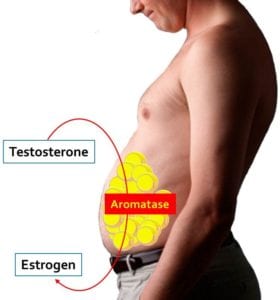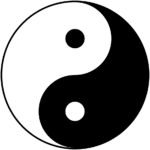What exactly are yin and yang and what exactly is the relevance to men’s health? We will explore these concepts in more depth from both a Western and Traditional Chinese Medicine perspective. Particularly, I will be discussing the most yang of the hormones, testosterone.
From traditional Chinese medicine perspective men are best represented by the concept of yang (rhymes with gong) and women, yin (pronounced een). Other examples of these concepts for the purpose of clarity include: fire/heat (yang) to water/cold (yin), activity (yang) to stillness (yin), function (yang) to substance (yin), Summer (yang) to Winter (yin), exercise (yang) to meditation (yin), etc…
Though the above examples show clear designation between these concepts, nothing is entirely black (yin) or white (yang). One cannot exist without the other. Fire cannot burn without the presence of a flammable substance. Looking closely at this symbol you can see how yin and yang flow continuously into and out of each other each always containing an aspect of the other. Our bodies function through similar dynamic with death being the only time that yin and yang truly separate from one another. Similarly, birth brings together these two opposing concepts to create a homeostatic, beautifully balanced being.
Testosterone is the primary (yang) hormone that makes men, well men, and man is it involved in a lot of important functions in the body. In the cardiovascular system, testosterone makes the heart beat stronger, widens the coronary arteries, increases blood supply to the heart; reduces cholesterol and minimizes atherosclerosis; reduces high blood pressure and decreases blood clot formation. Testosterone protects against obesity and diabetes and decreases the severity and incidence of these diseases by reducing fat mass and increasing lean muscle mass. It develops and maintains reproductive health: penis (size, sexual potency), prostate, body hair, testicles (blood supply, sperm count, fertility). It supports the brain and nerves by increasing the blood supply and the number of connections between neurons. It improves the mood and memory, and reduces anxiety. Lastly, testosterone sustains the bones (density and strength), the muscles (mass and strength) and skin.
Did you know that yang and testosterone decline with age (as does yin)? Just as the seasons change so do our bodies. We are born with a large reserve of yang and potential yang energy passed on by our parents. Testosterone peaks at 3 key points in one’s life, each guiding the path of the development. This process starts in utero with elevations of testosterone that if not present, a fetus would instead develop into female. The two additional times are puberty and full on adulthood (age 18 or so). Remember when you were a small child running around with no coat in the snow and your parents had to remind you it is actually really cold out? This was because you were pulsing with youthful, surging yang energy. Young children have an abundance of yang, which contributes to their high metabolism and ever changing growth and development. Puberty was not likely too much different- staying up late, experiencing an astronomically elevated libido, eating and burning masses of calories. Then, for some, it feels like the fast pace of life begins to catch up to you. This is a very clear example of the waxing and waning yang in the male.
To illustrate this yang energy in a scientific way, let us look at how the body produces testosterone. Approximately every four seconds, one testosterone producing Leydig cell dies in the testicles without being replaced. Of the 700 million healthy Leydig cells present at age 18, only about one-third will remain by age 70-80 and the free testosterone levels will decrease by more than 50% in the urine and blood. Consequently, over time men often experience the mental and physical symptoms of testosterone deficiency, while their height and size remains comparable to what it was in their twenties.
Do not let this scientific statistic bring you down. There is another concept of “graceful aging” that first needs to be explored. Like menopause, men experience a similar, but generally more gradual decline that has been termed “andropause.” Does an aging body still need as much testosterone and other hormones as young adult bodies of the same size and height? The short answer is no. As we reach maturity, the body no longer produces the amount of testosterone that was once necessary for growth, maturation and general maintenance. This is all part of our natural process of aging- our own seasons.
“The transition to middle age is first of all psychological, and to me means this: It is not we who are leaving, but a set of attitudes and interpretations regarding the body and mind that have outlasted their usefulness—and their youthfulness. We are being forced to leave them behind. They can no longer sustain us, not because we are old, but because they are old.”
James Hillman, a Jungian Analyst.
Testosterone is awesome and empowering, but be cautious because you can burn it out. Much like the fire of the yang needs substance (yin) to sustain itself so does the hormone system. Remember, there is always a balance to be maintained between the yin and the yang. Intense physical activity such as frequent sexual intercourse, long-distance running, and other strenuous activities “burns” greater amounts of testosterone and can thereby greatly deplete levels. Intense emotional stress blocks the release of luteinizing hormone (LH), and thus testosterone secretion as LH is the main stimulator of production. Positive emotions such as happiness and sexual pleasure may temporarily increase testosterone. Foods high in protein or saturated fat increase testosterone production, but sweets (sugars, chocolate, etc.) and a high-cereal fiber diet can reduce testosterone levels.
Did you know that men have estrogen too? That’s right, the primary hormone that makes women women is also utilized in the male body in small tightly regulated amounts. Estrogens however can become abnormally high relative to testosterone upsetting the balance and ratios that make a high functioning man. This process happens most often in the fatty tissue often associated with increases in the abdominal fat of aging men. Estrogens reduce testosterone activity by a double mechanism: Increasing the production and serum level of sex hormone binding globulin (SHBG), which increases the binding and sequestration of testosterone in the blood and reduces intracellular testosterone. Estrogens may also block testosterone receptors. High estradiol levels stimulate the proliferation of fibrous tissue in the prostate, causing the prostate to enlarge. Moreover, high estrogen levels have been associated with heart attacks. This effect has been demonstrated in women as well.

Several external factors can also potentiate the process of estrogen formation. For one, control that abdominal fat! Exercise plenty but give yourself ample time to recover. Moderate the consumption of alcohol, particularly hops heavy beer. Hops (Humulus lupulus) is a potent phytoestrogen that can accumulate in the system and reduce testosterone activity. Sad to say, most beer DOES NOT make you more of a man! In addition, industrial society has sadly flooded our water tables and processed consumables with synthetic estrogens (known as xenoestrogens). Drinking filtered water and avoiding using soft plastics (especially avoid heating them, which releases the xenoestrogens) is a good start to reducing your exposure.
As yang is the fiery functional energy that keeps us moving and changing yin is the still substance of potential energy that nourishes and balances the yang. One such key yin substance is, you guessed it, food…
There are many foods that can effectively lower estrogen activity and thereby enhance testosterone including: grass fed red meat 1-3x/week, cruciferous vegetables daily (broccoli, kale, collard, cauliflower, etc), shellfish, pine pollen, pine nuts and oats, to name a few.
Many men may explore the option of bioidentical or synthetic testosterone supplementation. This may help the symptoms but like most issues of hormone dysregulation testosterone IS NOT the one simple treatment solution to men’s health concerns. The foundations of health discussed here should never be neglected. Practicing a more balanced lifestyle for our yin and yang vitality should ideally start as early as puberty. Establish care with a practitioner you feel comfortable with and ask questions if needed to better understand the purpose of interventions instituted to address your concerns. Educate yourself but do not forget to allow others to educate and support you as well.
For guidance regarding your own health, contact our office to set up an appointment with one of our well-trained naturopathic doctors. We can be reached at 916-351-9355, or at [email protected].

